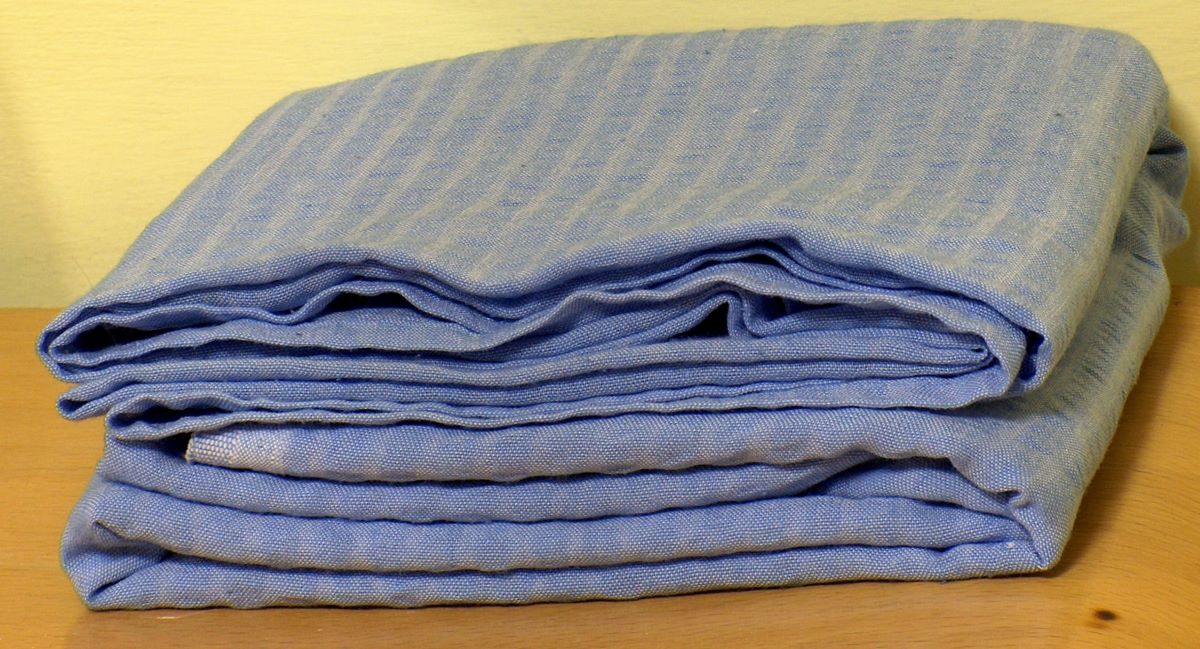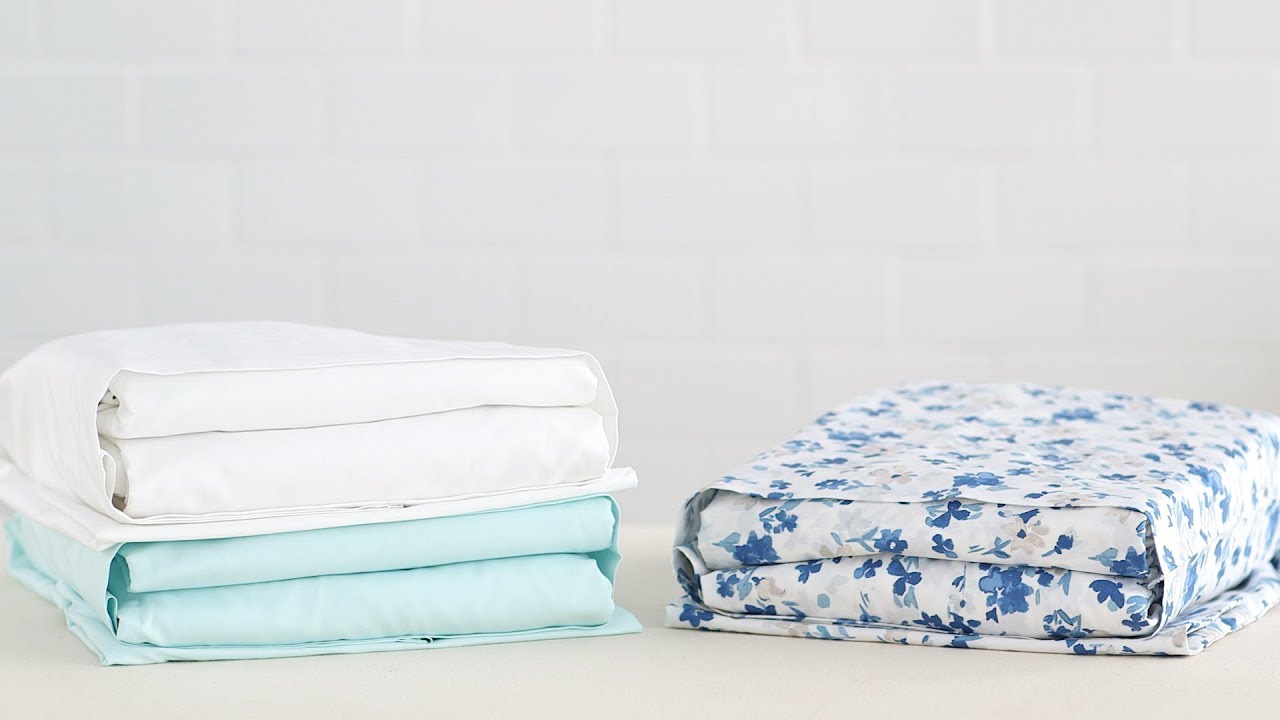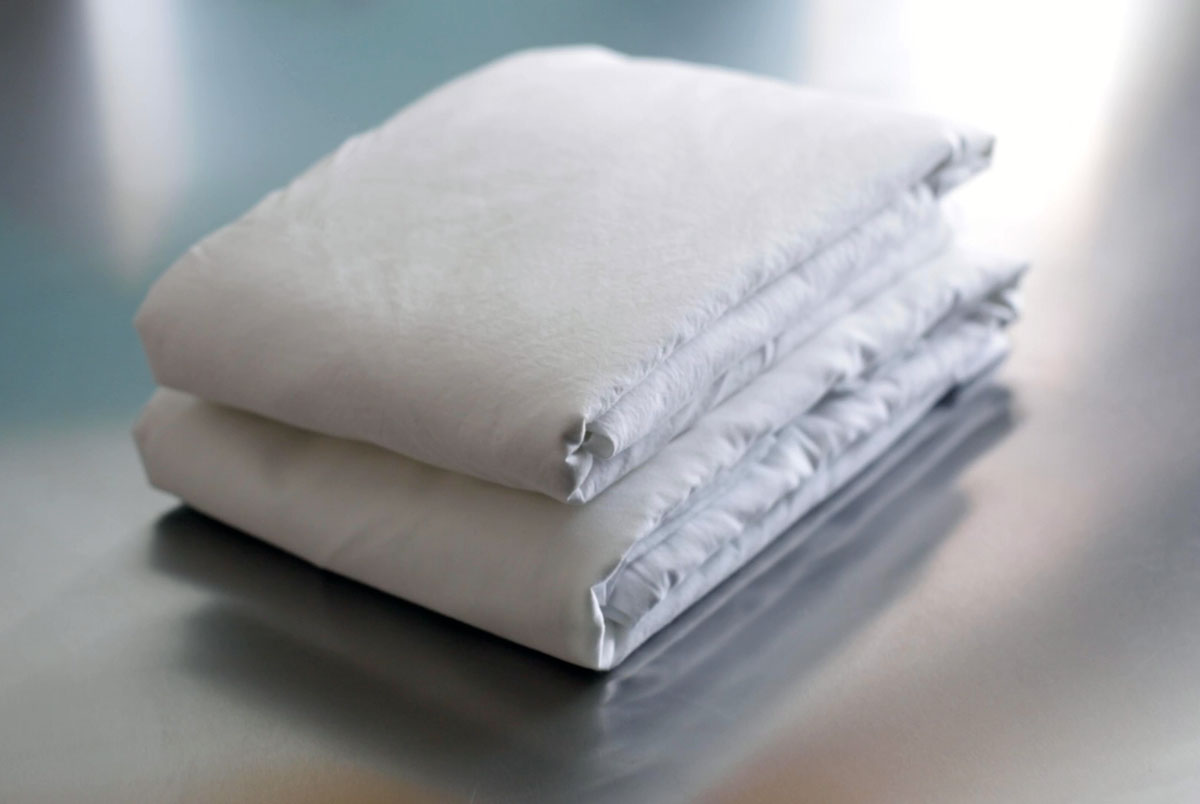Home>Furniture>Bedroom Furniture>How Often To Wash Bed Sheets


Bedroom Furniture
How Often To Wash Bed Sheets
Modified: December 7, 2023
Discover the best practices for washing bed sheets in your bedroom furniture. Learn how often to wash and maintain fresh and clean sheets for a comfortable sleep.
(Many of the links in this article redirect to a specific reviewed product. Your purchase of these products through affiliate links helps to generate commission for Storables.com, at no extra cost. Learn more)
Introduction
When it comes to maintaining a clean and comfortable bedroom, one of the most important tasks is washing your bed sheets regularly. Bed sheets can quickly accumulate dirt, sweat, oils, and even allergens, which can impact not only the cleanliness of your sleeping environment but also your overall sleep quality and health.
But how often should you wash your bed sheets? There is no one-size-fits-all answer to this question, as the frequency of washing bed sheets can vary depending on several factors. In this article, we will explore the different factors that affect the recommended frequency for washing bed sheets, signs that indicate when it’s time to wash them, as well as the proper steps to wash bed sheets effectively.
By understanding the importance of clean bed sheets and adopting the right washing routine, you can create a more inviting and hygienic sleep environment while also prolonging the lifespan of your sheets.
Key Takeaways:
- Maintain a clean and hygienic sleep environment by washing bed sheets every 1-2 weeks, adjusting based on personal needs, climate, and allergies. Regular washing promotes better sleep, reduces allergens, and extends sheet lifespan.
- Look for signs like odors, stains, and visible dirt to determine when to wash bed sheets. Follow proper washing steps and maintenance tips to ensure a fresh and inviting sleep environment, promoting overall well-being and comfort.
Factors affecting the frequency of washing bed sheets
The frequency at which you should wash your bed sheets can be influenced by several factors. Here are some important considerations:
- Personal hygiene habits: Your personal hygiene habits play a significant role in determining how often you should wash your bed sheets. If you shower before bed, remove makeup, and have clean skin, you may be able to go longer between washes compared to someone who sweats heavily, uses lotions or oils, or has certain skin conditions.
- Climate and season: The climate you live in can impact how quickly your bed sheets gather dirt and sweat. In hot and humid climates, you may find yourself washing sheets more frequently due to increased perspiration. Similarly, during colder months, when you may spend more time bundled up in bed, your sheets can accumulate more body oils and dead skin cells.
- Environmental factors: Environmental factors such as pets, outdoor activities, and exposure to dust or pollutants can affect how often you need to wash your bed sheets. If you have pets that sleep on your bed or if you spend a significant amount of time outdoors, your sheets may need to be washed more frequently to remove pet dander, dirt, and allergens.
- Allergies or sensitivities: If you suffer from allergies or have sensitive skin, it is essential to wash your bed sheets more frequently to reduce the presence of allergens, dust mites, or any irritants that can trigger a reaction. Regular washing can help alleviate symptoms and provide a more comfortable sleep environment.
- Mattress protection: The use of mattress protectors or covers can extend the lifespan of your mattress and reduce the need for frequent washing of bed sheets. These protective layers can act as a barrier, preventing sweat, spills, and dust from seeping into your mattress, thus reducing the frequency of washing bed sheets.
By taking these factors into account, you can determine the appropriate frequency for washing your bed sheets. In the next section, we will delve into the recommended frequency for washing bed sheets based on these considerations.
Recommended frequency for washing bed sheets
While there is no exact science to determine the perfect interval for washing bed sheets, here are some general guidelines that can help you establish a suitable routine:
- Every 1-2 weeks: For most individuals, washing bed sheets every 1-2 weeks is a reasonable frequency. This allows for regular cleaning while balancing the effort and time required for laundry tasks.
- More frequently for specific needs: Certain circumstances may warrant more frequent washing. For instance, if you have allergies, sensitivities, or skin conditions, it is advisable to wash your bed sheets at least once a week. Similarly, if you sweat heavily or if you engage in activities that make your sheets particularly dirty, such as exercising or working in dusty environments, you may consider washing them more frequently.
- In hot and humid climates: If you live in a hot and humid climate where sweat and humidity are constants, it is recommended to wash your bed sheets every week. This helps remove accumulated perspiration and prevents the growth of bacteria and odor-causing agents.
- Guest bedding: If you have guests staying over, it is best to provide them with freshly washed sheets and launder them again after their departure. This ensures a clean and welcoming environment for future guests.
- Personal preference: Ultimately, your personal preference and comfort should guide the frequency of washing your bed sheets. If you feel more refreshed and relaxed with freshly washed sheets, you may choose to wash them more frequently.
It’s worth noting that these recommendations are general guidelines, and you should adapt them based on your specific circumstances. Take into account factors such as climate, personal hygiene habits, allergies, and any particular needs that may arise. By doing so, you can establish a bed sheet washing frequency that suits your needs and helps maintain a clean and pleasant sleeping environment.
Signs that indicate bed sheets need to be washed
Knowing when it’s time to wash your bed sheets is essential for maintaining a clean and hygienic sleep environment. While the recommended frequency for washing bed sheets can act as a guideline, certain signs also indicate when it’s necessary to give your sheets a good wash. Here are some common indicators:
- Odors: If you notice an unpleasant or stale odor coming from your bed sheets, it is a clear sign that they need to be washed. Sweat, body oils, and other residues can accumulate over time, leading to unpleasant smells.
- Stains or spills: Any visible stains, spills, or marks on your bed sheets should be treated promptly and washed as soon as possible. Whether it’s from food or drinks, makeup, or bodily fluids, these stains can harbor bacteria and affect the cleanliness of your sheets.
- Visible dirt or discoloration: If you can visibly see dirt, dust, or discoloration on your bed sheets, it’s a clear indication that they are due for a wash. This can be particularly evident if you have light-colored sheets or if you engage in activities that make your sheets dirty, such as gardening or working in dusty environments.
- Allergies or skin irritations: If you or your sleeping partner experience increased allergies, respiratory issues, or skin irritations, it may be a sign that your bed sheets have accumulated allergens, dust mites, or other irritants. Washing the sheets can help eliminate these contaminants and provide a cleaner sleep surface.
- It’s been longer than the recommended timeframe: Even if you don’t notice any specific signs, it’s a good practice to follow the recommended frequency for washing bed sheets. By adhering to a regular washing routine, you can ensure that your bed sheets stay fresh, clean, and free from harmful bacteria and allergens.
Pay attention to these signs and trust your instincts when it comes to determining whether your bed sheets need to be washed. Regular cleaning and proper maintenance of your bed sheets not only promote cleanliness but also contribute to a better night’s sleep and overall well-being.
Wash your bed sheets at least once a week to remove sweat, oils, and dead skin cells. This helps prevent the buildup of allergens and keeps your sheets feeling fresh.
Steps to properly wash bed sheets
Washing bed sheets may seem like a simple task, but taking the proper steps can help ensure effective cleaning and maintain the quality of your sheets. Follow these steps to properly wash your bed sheets:
- Check the care instructions: Before starting the washing process, always refer to the care instructions provided by the manufacturer. Different materials and weaves may require specific washing instructions to prevent damage.
- Sort and separate: Sort your bed sheets by color and fabric type. Wash similar colors together to avoid color bleeding, and separate delicate materials from heavier fabrics to prevent tearing or damage.
- Pretreat stains: If you spot any stains or spills on your bed sheets, treat them before washing. Use a gentle stain remover or a prewash stain treatment to help remove the stains effectively. Follow the instructions on the product and allow it to penetrate the fabric before washing.
- Choose the right detergent: Select a mild, fragrance-free detergent suitable for your bed sheets. Avoid using harsh chemicals or detergent with strong fragrances that can leave residue or cause skin irritations. Consider using a gentle detergent specially formulated for sensitive skin if you have allergies or sensitivities.
- Set the appropriate wash settings: Follow the care instructions and set your washing machine to the recommended water temperature and cycle for the bed sheets. Generally, using warm water and a gentle or delicate cycle is suitable for most bed sheets. Avoid using hot water, as it can shrink or damage certain fabrics.
- Don’t overload the washing machine: It’s important not to overload the washing machine to ensure proper agitation and thorough cleaning. Give your bed sheets enough room to move freely in the washer, allowing detergent and water to penetrate the fabric evenly.
- Opt for an extra rinse cycle: To ensure all detergent residue is removed, consider adding an extra rinse cycle. This step helps eliminate any leftover soap and leaves your bed sheets fresh and clean.
- Drying: Once the washing cycle is complete, promptly remove the bed sheets from the washing machine. Shake them out gently to minimize wrinkles and hang them or place them in a dryer, depending on the care instructions. If using a dryer, choose a low-heat setting to prevent shrinking or damage. If air-drying, hang the sheets evenly to promote even drying and avoid mildew.
- Ironing and folding: If desired, iron the bed sheets on a suitable heat setting to remove any remaining wrinkles. Fold them neatly and store them in a dry and clean place until you’re ready to use them again.
By following these steps, you can ensure that your bed sheets are thoroughly cleaned and maintained, allowing you to enjoy a fresh and comfortable sleep surface night after night.
Read more: How Often Should You Change Your Bed Sheets
Tips for maintaining clean bed sheets between washes
While regular washing is crucial for clean bed sheets, there are several tips you can follow to help maintain their cleanliness between washes. These tips can help extend the freshness of your bed sheets and make the washing process more effective:
- Practice good personal hygiene: Showering before bed and removing makeup can help minimize the amount of dirt, oils, and sweat that transfer onto your bed sheets. By starting with a clean body, you can reduce the buildup of grime on your sheets.
- Keep pets off the bed: If you have pets, it’s best to keep them off the bed. Pet fur, dander, and dirt can easily accumulate on bed sheets, contributing to odors and allergens. Consider designating a separate sleeping area for your furry friends.
- Use a top sheet or light blanket: Adding a top sheet, light blanket, or bedspread can help protect your bed sheets from direct contact with your body and absorb sweat and oils. These additional layers can be easily washed more frequently than the bed sheets themselves.
- Rotate your bed sheets: Having multiple sets of bed sheets allows you to rotate them regularly. This way, you can give each set time to air out and reduce the accumulation of moisture and odors.
- Keep your bedroom clean: Regularly cleaning your bedroom, including vacuuming the mattress, dusting surfaces, and sweeping or mopping the floor, helps minimize dust and allergens that can settle on your bed sheets.
- Avoid eating in bed: Eating in bed can lead to accidental spills and stains on your bed sheets. It’s best to enjoy your meals in designated areas to prevent food particles and stains from soiling your sheets.
- Use a mattress protector: Investing in a mattress protector can safeguard your mattress from spills, sweat, and stains. This protective layer can significantly extend the life of your mattress and minimize the need for frequent washing of bed sheets.
- Change pillowcases frequently: Pillowcases come into direct contact with your face and hair and can accumulate oil and sweat. Consider changing pillowcases every few days or at least once a week to maintain cleanliness and freshness.
By implementing these tips, you can maintain cleaner bed sheets between washes, reducing the need for frequent laundering and prolonging their lifespan. It’s important to strike a balance between regular washing and these maintenance practices to ensure a fresh and comfortable sleep environment.
Benefits of regularly washing bed sheets
Regularly washing your bed sheets is not just essential for maintaining cleanliness, but it also offers several benefits for your health, quality of sleep, and overall well-being. Here are some key benefits of keeping up with a routine of washing bed sheets:
- Promotes better sleep: Clean bed sheets provide a fresh and inviting sleeping environment, allowing you to relax and unwind more easily. Sleeping on sheets free from dirt, sweat, and allergens can contribute to a more restful and rejuvenating sleep experience.
- Reduces allergens and irritants: Over time, bed sheets can accumulate allergens, dust mites, pet dander, and other irritants that can trigger allergies or respiratory issues. Regular washing helps eliminate these contaminants, providing relief for allergy sufferers and creating a healthier sleep environment.
- Prevents unpleasant odors: Accumulated sweat, oils, and dirt on bed sheets can lead to unpleasant odors. Keeping up with a washing routine helps eliminate these odors, creating a fresher and more pleasant-smelling bed.
- Minimizes the risk of skin issues: Dirty bed sheets can harbor bacteria and fungi, increasing the risk of skin irritations, acne breakouts, and infections. Regular washing helps keep germs at bay, reducing the likelihood of developing skin issues.
- Extends the lifespan of your bed sheets: By washing bed sheets regularly, you can remove dirt, oils, and sweat that can break down the fibers over time. This helps extend the lifespan of your sheets, saving you money in the long run and allowing you to enjoy their comfort for a more extended period.
- Improves overall cleanliness: Bed sheets are in direct contact with our bodies for hours every night, making them susceptible to dirt and bacteria. Regular washing ensures that you have a clean and hygienic sleep surface, reducing the risk of transferring dirt and germs back onto your body.
- Enhances the appearance of your bedroom: Clean, well-maintained bed sheets contribute to the overall aesthetics of your bedroom. Freshly washed sheets can bring a sense of tidiness and comfort, making your bedroom a more inviting and peaceful space.
By understanding the benefits of regular bed sheet washing and incorporating it into your cleaning routine, you can create a healthier, more comfortable, and refreshing environment for a great night’s sleep.
Conclusion
Keeping your bed sheets clean is crucial for maintaining a hygienic and comfortable sleep environment. By understanding the factors that affect the frequency of washing bed sheets, as well as the recommended guidelines, you can establish a routine that works best for you.
Signs such as odors, stains, visible dirt, allergies, and adherence to the recommended timeframe can help you determine when it’s time to wash your bed sheets. Following the proper steps to wash bed sheets, including sorting, pretreating stains, choosing the right detergent and wash settings, and drying them appropriately, ensures effective and thorough cleaning.
In addition to regular washing, implementing maintenance strategies such as practicing good personal hygiene, keeping pets off the bed, using top sheets or light blankets, and using mattress protectors can help extend the cleanliness of your bed sheets between washes.
The benefits of regularly washing bed sheets are numerous. It promotes better sleep, reduces allergens and irritants, prevents unpleasant odors, minimizes the risk of skin issues, extends the lifespan of your sheets, improves overall cleanliness, and enhances the appearance of your bedroom.
So, make it a priority to wash your bed sheets on a regular basis, taking into account your personal circumstances and the recommendations provided. Your efforts will not only contribute to a healthier and more comfortable sleeping environment but also ensure that your bed is a sanctuary for relaxation and rejuvenation.
Remember, fresh, clean bed sheets are not just a luxury but a necessity for a good night’s sleep and overall well-being.
Frequently Asked Questions about How Often To Wash Bed Sheets
Was this page helpful?
At Storables.com, we guarantee accurate and reliable information. Our content, validated by Expert Board Contributors, is crafted following stringent Editorial Policies. We're committed to providing you with well-researched, expert-backed insights for all your informational needs.















0 thoughts on “How Often To Wash Bed Sheets”